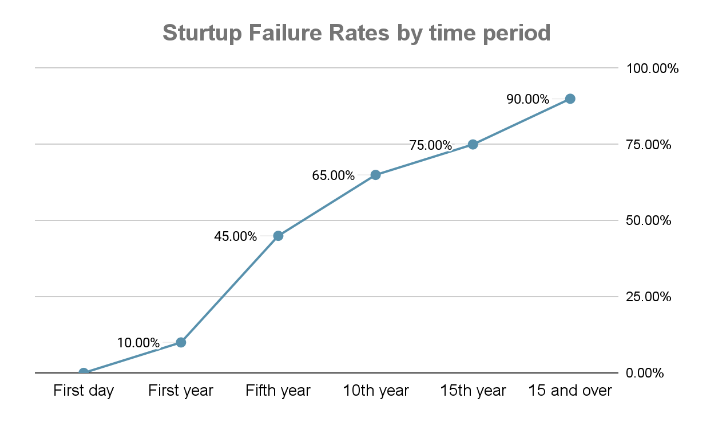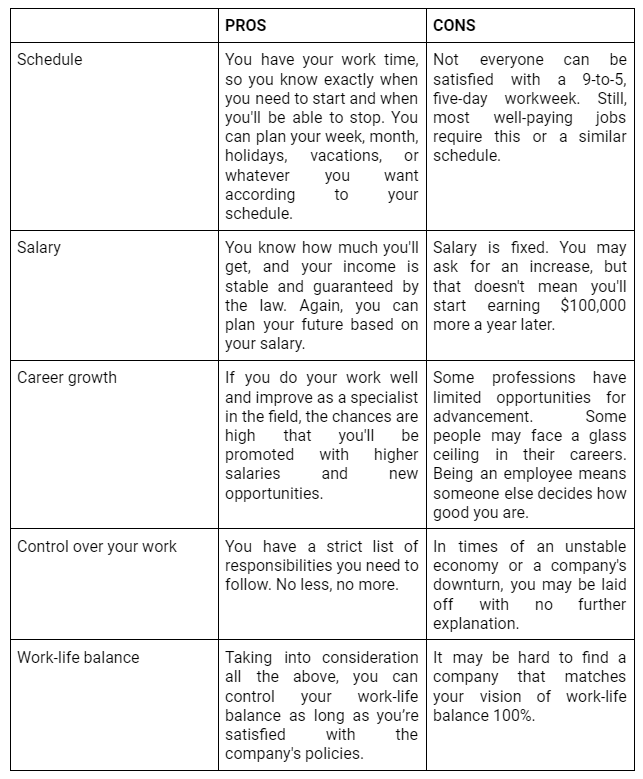There is a common misconception that having your own business equals success. However, the fact that there are still people who choose not to start a business proves otherwise.
Many people are too naive or blind to see the concerning statistics. According to the Startup Genome report mentioned in Forbes, 9 out of 10 new businesses fail. Most of these failures are attributed to the reasons we've mentioned above — lack of understanding of all the difficulties involved in the process. Starting a business requires preparation and knowledge that some people don't possess.

Why is it so complicated?
Every business, regardless of size, even if it has no employees and the owner manages everything, must adhere to certain fundamental rules that apply to everyone.
It takes time
Some business coaches claim that with their guidance, you can become a millionaire entrepreneur in a month. Congratulations, that's a scam. Interestingly, while people understand that they shouldn't believe these coaches, they often believe they'll make a good profit within a month of starting a business. Essentially, they end up scamming themselves.
Entrepreneurs who have been in the game for more than a year can attest that profit takes time. You'll have to work hard and invest your own money for a long time before you can even stop losing money. On average, according to Yahoo Finance, it takes two to three years to start earning anything from your venture.
Wealth is a bad goal
In continuation of the previous point, if you're looking for quick money, entrepreneurship is the wrong path. Generally, when a person simply wants to get rich quickly, they usually lack the passion and drive needed to achieve it.
For a business to become not only profitable but also successful, it must have a purpose, a so-called mission. This is what motivates people to persist for years, even without substantial income. If your only goal is money, you'll likely give up within two months.
You’ll have to become a multi-tool
This one might be confusing. Why should I do everything myself if I can hire all the necessary staff? Well, if you have enough capital, of course you can. However, you'll still need to oversee everything, understand all the processes, make decisions, and lead the way. But if you don’t have enough capital, you won’t be assigning tasks to others like a manager; you'll be doing everything yourself: from production to doorstep delivery to paying taxes, and much more.
You are not guaranteed anything
Starting a business means taking a risk. There is nothing less stable than this. There is no guarantee of success, profit, stability, or financial and governmental support. You may be balancing on the edge of bankruptcy most of the time for the first three years. And even after that, one wrong step may throw you right back to the bottom.
Business is unpredictable. Even the giants of entrepreneurship make huge mistakes which cost them billions. Don’t believe me? Check out Elon Musk’s Boring Company.
- It takes two to three years on average to start making any profit
- Wealth should be not the one and only goal; otherwise, the business won’t last long
- Being an entrepreneur means you need to know everything and be able to do anything
- It’s a weight on your shoulders that no one can bear except for you
Okay, we’ve mentioned that there are some preparational steps too. Do you know what they are? It's more than just starting capital; it's a whole plan.
Idea and purpose
Without an idea, you won’t make it. Yes, it’s that simple. It has to bring something innovative to the market, something completely new or better than what others already offer.
Ideas go hand in hand with purposes. Your business should not only provide a unique product; it should also bring something into people's lives. Some experts call it a mission because successful entrepreneurs start with the feeling that they need to help people, that they need to create something cool and useful.
Market research
To better understand whether your idea will skyrocket, you'll need to research the market you're entering. This involves two aspects: determining if there's anything similar to your idea and, if so, how yours is better; and assessing whether people need it right now, and if so, why? Once you've answered these questions, you'll have a basic understanding of the market. Then, dive even deeper — research companies, target audience, regulations, and potential areas for growth. Without these factors, failure is almost unavoidable.
Knowledge base
As we've already mentioned, an entrepreneur is a multi-tool. So, in running a business, successful or not, you have to understand how to do everything. You need to learn how to manage finances, how taxes for entrepreneurs work, what laws and regulations you need to follow, and how to follow them. There is a lot of homework for those considering starting a business.
Finances
Knowing finances is crucial. It's not just about counting money, though that's important too. It's mostly about building a clear and realistic financial plan.
- If you have capital, you need to thoughtfully divide it among resources, supplies, rent, and so on.
- If you don’t have capital, you’ll need to get a loan and find investors. Both will require your financial plan as well.
- If you’re thinking of hiring employees, you need to consider compensation in general, not just salaries. Otherwise, no one will work for you.
- Taxes deserve their own place on the list. The importance of understanding taxes is so obvious that most companies have an employee who’s in charge of them. So if you have the opportunity, it's better to hire someone.
Probable outcome
And for all the hard work that you’ve done, what do you get? Let me guess: some mental health or sleeping problems, no money in your account, and a ruined work-life balance. When you’re building a business, especially in the early stages, you have no days off; you’re constantly thinking about how you can improve and make things better—that’s a lot of stress for a person. And yeah, most rookie entrepreneurs become broke very quickly. That’s how much a business takes.
- The core of any business is its purpose, its idea – how will it help people and contribute to the world
- You have to know absolutely everything about the market you’re going to enter
- Entrepreneurship requires dedication and studying, not just money
- Financial plan is a must for any startup
- Be aware that even if you ensure all the above, it still will be a hard path
‘Okay, okay, enough! We get it! It’s hard! But we don’t want to work for someone else!’ - if that’s what you’re thinking, you’re not ready yet. If just reading about all the problems you need to overcome makes you tired, the real thing will crush you. And first of all…
What’s wrong with being hired by a company?
Sure, everything has its drawbacks, but it also has its advantages. Let’s categorize some aspects of being an employee into pros and cons.

As you can see, being an employee offers one important thing that entrepreneurship will never be able to offer - stability. For many people, life becomes much easier when you know exactly when, where, how, and how much.
In one of our previous articles, we mentioned median annual wages by major occupation. And guess which one is in first place? Management. The median annual wage in management is more than two times higher than the median of all occupations nationwide. It’s an enormous advantage that people should not overlook.
- Everything has both disadvantages and advantages, including employment. So make sure that all the advantages of being hired by someone are really not for you before leaving employment
- Employment has one unarguable advantage – stability
- Entrepreneurship may not guarantee you a good income, while jobs in industries like management can
What to choose at the end of the day?
If you ask me, I would recommend prioritizing growth above all else — professional, mental, individual, and career growth. What do I mean? Let me explain.
When you can't decide between two options, why not choose both? This advice works perfectly in this case. You don’t have to choose only one and discard the other.
Take small steps. If you're currently employed but aspire to start your own business, start by observing everything happening in your workplace. Pay attention to how colleagues communicate, how the company manages its work, its finances, taxes, and employee satisfaction - basically, everything you can observe. Learn from the successes and failures of others, rather than solely from your own experiences.
If you’re not employed and are considering whether to start a business or find a job, remember all the rules and steps we’ve discussed above. Can you follow all the rules? Have you taken all the steps? If not, find a job. If you have already come up with a brilliant idea, consider working for a company related to or in the field of your future business. This will help you gain necessary insights within a company and provide you with a good and stable income to invest in your own venture.
Generally speaking, entrepreneurship is not about wealth or fame, or both. It’s about sincere passion and taking risks to stand your ground. Do you think you are passionate enough? Then try it out, but do not forget to follow at least some of the advice we provided here. Good luck!
- You don’t necessarily have to choose between the two: you can work for some company while starting your own venture
- Make sure that you’re prepared enough
- Entrepreneurship is not about wealth; it’s about passion
